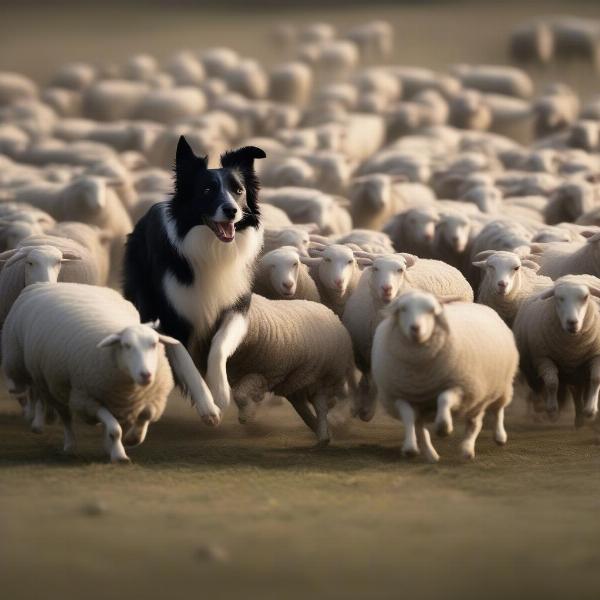Choosing the best dog to train can feel overwhelming with so many wonderful breeds out there. Whether you’re looking for a loyal companion, an energetic playmate, or a dedicated working dog, trainability plays a vital role in building a strong bond and ensuring a harmonious life together. This article explores the factors influencing a dog’s trainability and highlights some breeds renowned for their eagerness to learn and please. Ultimately, the “best” dog is the one that best suits your lifestyle, experience, and training commitment.
Are you dreaming of a dog that masters tricks with ease? Or perhaps a well-behaved companion who understands boundaries? Many factors contribute to a dog’s trainability, including breed characteristics, individual temperament, and your training approach. Some breeds are naturally predisposed to learning, possessing traits like intelligence, focus, and a willingness to please. However, even within these breeds, individual personalities vary. Your patience, consistency, and positive reinforcement techniques are crucial to successful training, regardless of the breed.
Top Breeds Known for Trainability
What are the easiest dog breeds to train? Here’s a glimpse at some breeds consistently recognized for their trainability:
-
Border Collie: Renowned for their herding instincts and exceptional intelligence, Border Collies excel in various canine sports and activities. They thrive on mental stimulation and are eager to please their owners.
-
Poodle: Highly intelligent and adaptable, Poodles come in three sizes, offering options for different living situations. Their hypoallergenic coat is a bonus for allergy sufferers. They’re quick learners and excel in obedience training.
-
German Shepherd: Known for their loyalty, courage, and intelligence, German Shepherds are often chosen for police and military work. They are highly trainable and require consistent leadership.
-
Golden Retriever: Friendly, outgoing, and eager to please, Golden Retrievers are popular family dogs. They excel in retrieving, obedience, and even therapy work. Their gentle nature makes them excellent companions for children.
-
Doberman Pinscher: Intelligent and alert, Doberman Pinschers are often used as guard dogs. They respond well to consistent training and are fiercely loyal to their families.
 Border Collie herding sheep
Border Collie herding sheep
Choosing the Right Breed for You
Which dog breed is most trainable for first time owners? While the breeds listed above are known for their trainability, it’s essential to consider your individual circumstances. If you’re a first-time owner, a breed with a gentler temperament, like a Golden Retriever, might be a good choice. Experienced owners might be better suited to handle the high energy and intelligence of a Border Collie.
Matching Your Lifestyle
Beyond breed, consider your lifestyle and living environment. A high-energy breed needs plenty of exercise and mental stimulation. If you live in a small apartment, a smaller, less active breed might be a better fit. Think about your daily routine, the amount of time you can dedicate to training and exercise, and your family’s overall dynamic.
Training Tips for Success
Regardless of the breed you choose, consistency and positive reinforcement are key to successful training. Start early with socialization and basic obedience. Short, frequent training sessions are more effective than long, drawn-out ones. Reward good behavior with praise, treats, or toys. Be patient and understanding, and remember that every dog learns at its own pace.
Building a Strong Bond
Training is not just about teaching commands; it’s about building a strong bond with your dog. Through consistent training, you’ll establish clear communication, build trust, and create a harmonious relationship. A well-trained dog is a happy dog, and a happy dog makes for a happy owner.
Conclusion
Finding the best dog to train is a personal journey. While certain breeds are naturally more inclined towards learning, every dog is an individual. Your dedication to positive reinforcement and consistent training, combined with choosing a breed that aligns with your lifestyle, will pave the way for a successful and rewarding partnership. So, embark on this exciting adventure, and discover the joy of training your perfect canine companion. Remember, the best dog to train is the one that fits seamlessly into your life and brings you years of unconditional love and companionship.
FAQ
- What is the smartest dog breed? While Border Collies are often touted as the smartest, intelligence varies within breeds.
- Are smaller dogs easier to train than larger dogs? Not necessarily. Trainability depends more on temperament and individual personality.
- How long does it take to train a dog? Training is an ongoing process, but basic obedience can be achieved in a few months.
- What are some common dog training mistakes? Inconsistency, using punishment, and expecting too much too soon are common pitfalls.
- What is the best age to start training a dog? As early as possible! Start with socialization and basic commands as soon as you bring your puppy home.
- Do I need professional dog training? While not always necessary, professional guidance can be beneficial, especially for challenging behaviors.
- How can I find a qualified dog trainer? Ask your veterinarian for recommendations or search for certified dog trainers in your area.
ILM Dog is your global resource for expert advice on dog breeds, health, training, nutrition, grooming, and more. Whether you’re a seasoned dog owner or just starting your journey, we provide practical and reliable information to help you care for your furry friend. We specialize in helping you find the perfect breed for your lifestyle and offer guidance on all aspects of dog care, including training and behavior. For personalized advice, contact us via email at [email protected] or phone at +44 20-3965-8624. ILM Dog is committed to helping you build a strong and loving bond with your canine companion.